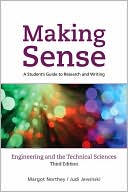

 |

|

The average rating for Making Sense in Engineering and the Technical Sciences: A Student's Guide to Research and Writing based on 2 reviews is 3 stars.
Review # 1 was written on 2011-02-22 00:00:00 William Scharnagle William ScharnagleIn Rhetorical Refusals, Schilb argues that a certain type of rhetoric, which he calls "rhetorical refusals," has gone largely unstudied and argues that it merits further exploration. He defines a rhetorical refusal as "an act of writing or speaking in which the rhetor pointedly refuses to do what the audience considers rhetorically normal." (3) A rhetorical refusal can be quite explicit or more implicit (3-4) and has three general criteria: it "challenges audience expectations" (4), its "break with protocol is clearly deliberate" (4), and the rhetor "suggests that a higher principle trumps common rhetorical decorum" (5). Though "refusal" often evokes a leftist or progressive politics in the minds of readers, Schilb is clear that rhetorical refusals are used in all sorts of situations by rhetors of various political persuasions, and that each act must be judged in its own context. Schilb spends Part 1 of his book outlining criteria for evaluating rhetorical refusals. Following Perelman and Olbrechts-Tyteca, Shilb sees rhetorical refusals as attempts to get your audience to judge another audience (44-46). In Chapter 2, Shilb outlines various criteria to use in evaluating rhetorical refusals, including style, ethos, genre negotiation, epistemology, and ontological claims. In Chapter 3, he applies these criteria to his test case, Arlene Croce's "review" of Still/Here. In this "review," Croce criticizes "victim art" as not art and states her refusals to see Still/Here, a performance about HIV/AIDS, which she "reviews," though claims she is not reviewing. Ultimately, Shilb finds her argument "dubious" (68) and compares it to successful works that are not rhetorical refusals. While I agree with Shilb's reading, and I think it's wonderfully done, at this point in the book I would have liked to see a more in-depth discussion of a rhetorical refusal that he finds "successful" or not "dubious." However, Part 2 of the book does focus more on successful rhetorical refusals. Part 2 of the book (Chapters 4 to 7) contends with certain American traditions or ideals that rhetorical refusals help to question. Chapter 4 deals explicitly with the ideal of openness to debate by examining Deborah Lipstadt's refusal to be open to dialogue with Holocaust deniers in her book Denying the Holocaust: The Growing Assault on Truth and Memory. In Chapter 5, Shilb takes up how a text travels into new and different contexts, noting that it's important to analyze and discuss texts (specifically rhetorical refusals) in contexts different from their initial debut. The texts he analyzes in this chapter also challenge commonplace distinctions between public and private. Chapter 6 focuses on Frederick Douglas's commemoration speech of Lincoln, in order to investigate how rhetorical refusals can be embedded within a text that also does other rhetorical work. Additionally, he uses this rhetorical refusal to discuss how refusals might question the notion of a united nation when used at memorials. Schilb's last chapter turns to literature, focusing on Tim O'Brien's In the Lake of the Woods, which he sees as being a refusal to comply with they conventions of a mystery genre. After offering a nuanced reading of the book, Schilb compares the book's uncertainty with the certainty about Vietnam offered in Bob Kery's memoir, When I Was a Young Man. Schilb argues that rhetorical refusals in literature might help us to contend with our memory of war, and urges literary studies to take a rhetorical approach to literature. Schilb concludes by offering up other rhetorical refusals that have been used by citizens, arguing that rhetorical refusals need further study and can be, when they are "good," helpful to our civic discourse. I found Schilb's discussion interesting, and one that opens up avenues of scholarly research about rhetorical refusals. I think Schilb's discussion is pretty comprehensive about what constitutes rhetorical refusals, but I would have also liked to see more examples discussed in various other contexts. The book is a quick read and very approachable, and another 100 pages exploring more refusals might detract from its focus and make it less likely to be read. But it seems that there are such fruitful and obvious avenues for discussing this type of rhetoric, and putting his discussion in the context of more conversations. Particularly, it seems that gendered, classed, and sexual rhetorical refusals lend themselves quite well to Schilb's project. However, as it stands, a great book. |
Review # 2 was written on 2012-02-24 00:00:00 Sean Maxwell Sean MaxwellAn interesting book about one particular rhetorical strategy: the refusal. Schilb characterizes refusals as deliberate rejections of an audiences expectation in an effort to make a point. The text is a provocative and enjoyable read about a rhetorical form that has become far more common since Schilb brought them to our attention. In this way, the book is a welcome contribution to current conversations about the exercise and limits of the first amendment through moments of rhetorical refusal, such as KellyAnne Conway's aversion to direct questioning or the Navy Seal's father refusing to speak with the President. Worth a read for folks interested in rhetoric or first amendment issues. Would love a revised edition in light of contemporary politics! |
CAN'T FIND WHAT YOU'RE LOOKING FOR? CLICK HERE!!!